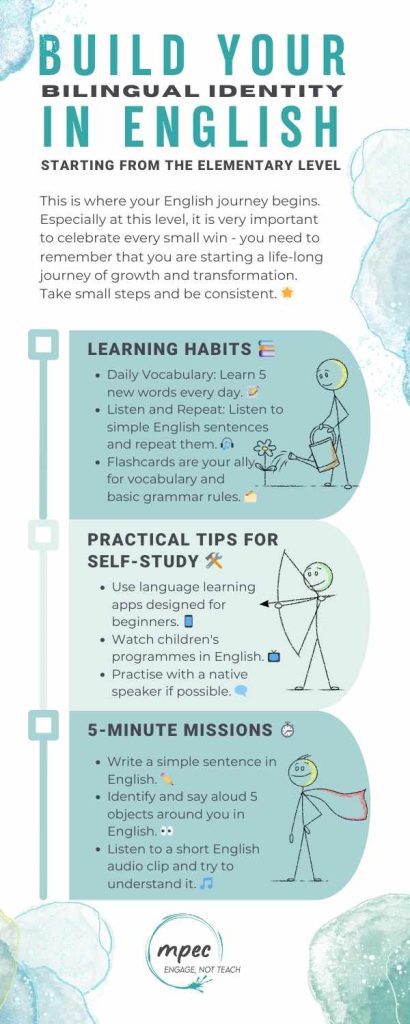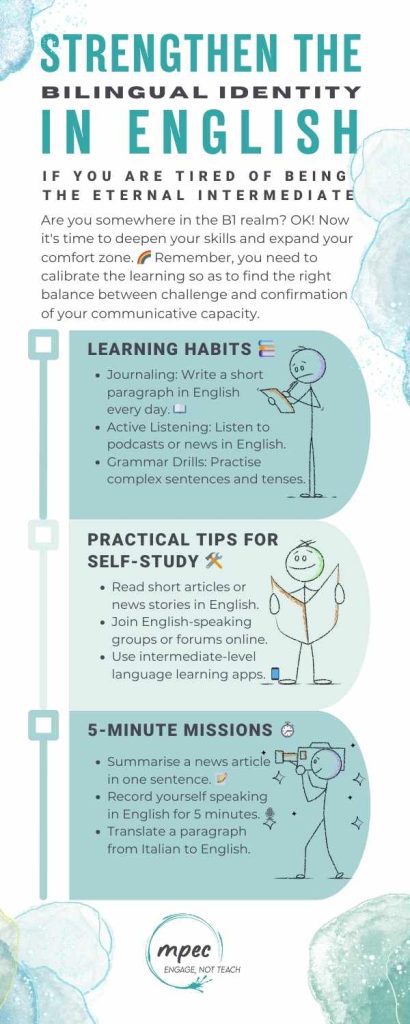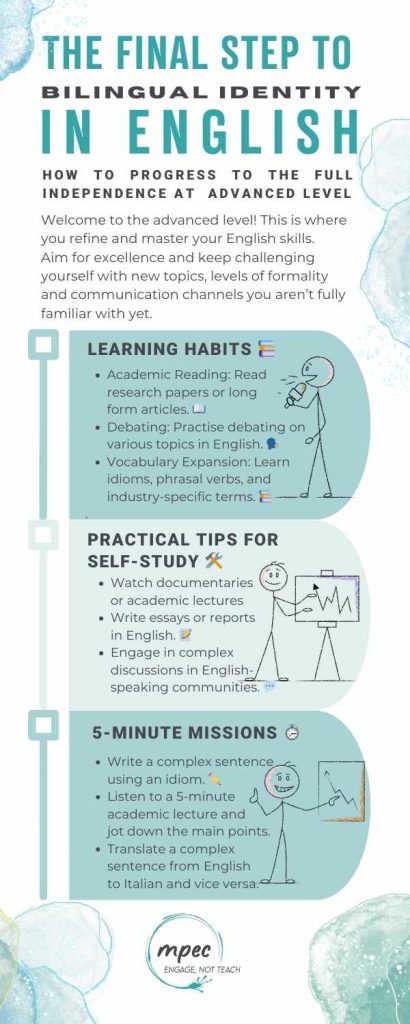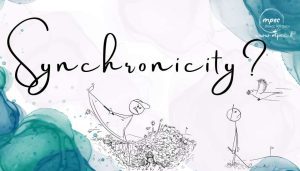Learning a second language is about more than just vocabulary and grammar; it’s about building a bilingual identity.
Written with love by: My Personal English Coach
This article dives into the neuroscience of the bilingual brain, explores the power of belief and shares some practical strategies which will help you move away from studying and towards LIVING English.
The neuroscience of the bilingual brain is a rapidly growing field. Neuroplasticity, or the brain’s ability to rewire itself, plays a crucial role in language acquisition.
Key Points:
- Cognitive Flexibility: Managing two languages enhances your brain’s executive functions.
- Enhanced Memory: Bilingual individuals often have better working memory.
- Delayed Cognitive Aging: Bilingualism can delay the onset of diseases like Alzheimer’s.
It’s obvious that knowing more than one language can make certain things easier – like traveling or watching movies without subtitles. But are there other advantages to having a bilingual (or multilingual) brain?
Mia Nacamulli
The Key Importance of Beliefs
Belief is a psychological framework that can significantly impact your language learning journey. Albert Bandura’s concept of self-efficacy is particularly relevant here.
Bandura’s Self-Efficacy Theory Of Motivation In Psychology
- Psychologist Albert Bandura has defined self-efficacy as people’s belief in their ability to control their functioning and events that affect their lives.
- One’s sense of self-efficacy can provide the foundation for motivation, well-being, and personal accomplishment.
- People’s beliefs in their efficacy are developed by four primary sources of influence, including (i) mastery experiences, (ii) vicarious experiences, (iii) social persuasion, and (iv) emotional states.
- High self-efficacy has numerous benefits to daily life, such as resilience to adversity and stress, healthy lifestyle habits, improved employee performance, and educational achievement.
Framework for Building Belief
- Self-Assessment: Regularly evaluate your skills.
- Goal Setting: Create achievable milestones.
- Positive Affirmations: Use affirmations to reinforce your belief.
- Seek Support: Surround yourself with supportive people.
Fake It Till You Make It!
Amy Cuddy’s famous TED Talk delves into the psychology of “faking it till you make it.” By adopting the posture and confidence of a fluent English speaker, you can create a positive feedback loop that enhances your language skills.
TED Talk di Riferimento:
Removing the Delusion of Perfection
The pursuit of perfection can be a significant barrier in language learning. Here’s where coaching for the inner critic comes into play.
Coaching for the Inner Critic
- Identify the Critic: Recognise when your inner critic is speaking.
- Challenge the Critic: Ask yourself, “Is this really true?”
- Reframe the Narrative: Instead of saying, “I’m terrible at this,” say, “I’m still learning, and that’s okay.”
- Celebrate Small Wins: Every time you learn a new word or successfully construct a complex sentence, celebrate it.
TED Talk You Should Watch:
Conclusion
Building a bilingual identity in English is a multifaceted process that engages both the brain and the belief system. By understanding the neuroscience behind language learning, harnessing the power of belief, and adopting practical strategies, you can set yourself on a path to not just learning English but living it.
Ready to geo further? Here are the next steps towards your Bilingual Identity in English:
Elementary A1

Intermediate B1

Advanced C1

#FormazioneInglese #CompetenzeLinguistiche #SoftSkills #CompetenzeAziendali #ComunicazioneAziendale #GoalGetter #HabitHacker #UnleashYourPotential
#MPECJourney #IdentitàBilingue #AutoCoaching #LearningEnglish #ImparareInglese #CelebrateLearning #CelebriamoLApprendimento #BilingualIdentity #OctoberEdition #EdizioneOttobre #SelfReflection #RiflessionePersonale #5MinMissions #Missioni5Minuti #PracticalTips #ConsigliPratici #LearningHabits #AbitudiniDiApprendimento #MPECCommunity #ComunitàMPEC
References
- Bandura, A. (1977). Self-efficacy: Toward a Unifying Theory of Behavioral Change. Psychological Review, 84(2), 191–215.
- Cuddy, A. (2012). Your body language may shape who you are. TED Global.





